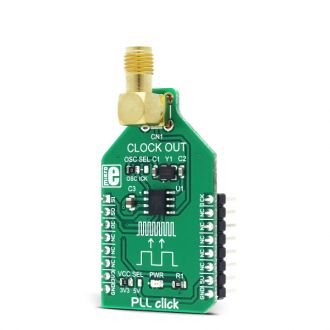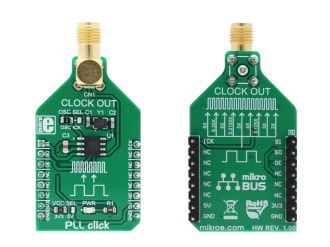
We strongly encourage users to use Package manager for sharing their code on Libstock website, because it boosts your efficiency and leaves the end user with no room for error. [more info]

Rating:
Author: MIKROE
Last Updated: 2018-04-25
Package Version: 1.0.0.0
mikroSDK Library: 1.0.0.0
Category: Clock generator
Downloaded: 6293 times
Not followed.
License: MIT license
PLL click is a frequency multiplier which uses the Phase-Locked Loop (PLL) techniques to provide a high-frequency clock output from a cheap, standard fundamental mode crystal oscillator.
Do you want to subscribe in order to receive notifications regarding "PLL click" changes.
Do you want to unsubscribe in order to stop receiving notifications regarding "PLL click" changes.
Do you want to report abuse regarding "PLL click".


Library Description
Initializes and defines I2C driver and driver functions which offer a choice of writing in registers and reading from the registers. The library also has the ability for light measurements. The library can measure Small, Medium, and Large IR light, White and Large White light and UV and Deep UV light, whose values can be 16-bit or 24-bit. The library also offers a choice between channels that the user wants to measure desired light. For more details check the documentation.
Key functions:
void pll_setClockOutput(uint8_t mode) - Function for enabling and disabling of the clock output.
void pll_setPLL_3x() - Function for multiplying of the clock 3 times.
void pll_setPLL_4x() - Function for multiplying of the clock 4 times.
void pll_setPLL_5x() - Function for multiplying of the clock 5 times.
void pll_setPLL_6x() - Function for multiplying of the clock 6 times.
void pll_setPLL_8x() - Function for multiplying of the clock 8 times.
Examples Description
For the test, the onboard crystal oscillator is used where the frequency of the input clock is fixed. Using ICK (PWM pin) as input, it allows continuous output frequency setting to be in a wide range.
void applicationTask()
{
pll_setPLL_4x();
Delay_ms( 2000 );
pll_setPLL_5x();
Delay_ms( 2000 );
pll_setPLL_6x();
Delay_ms( 2000 );
pll_setPLL_8x();
Delay_ms( 2000 );
}
Other mikroE Libraries used in the example:
Additional notes and information
Depending on the development board you are using, you may need USB UART click, USB UART 2 click or RS232 click to connect to your PC, for development systems with no UART to USB interface available on the board. The terminal available in all MikroElektronika compilers, or any other terminal application of your choice, can be used to read the message.